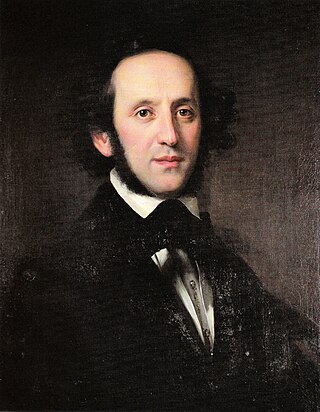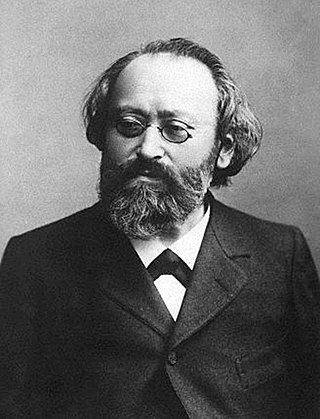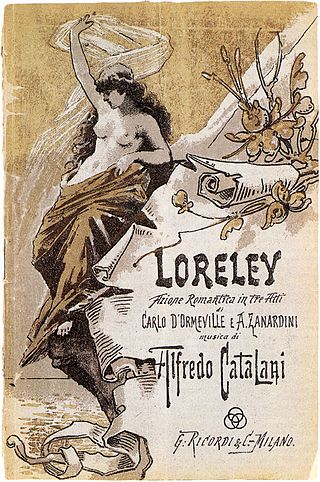Related Research Articles

Jakob Ludwig Felix Mendelssohn Bartholdy, widely known as Felix Mendelssohn, was a German composer, pianist, organist and conductor of the early Romantic period. Mendelssohn's compositions include symphonies, concertos, piano music, organ music and chamber music. His best-known works include the overture and incidental music for A Midsummer Night's Dream, the Italian Symphony, the Scottish Symphony, the oratorio St. Paul, the oratorio Elijah, the overture The Hebrides, the mature Violin Concerto, the String Octet, and the melody used in the Christmas carol "Hark! The Herald Angels Sing". Mendelssohn's Songs Without Words are his most famous solo piano compositions.

Max Bruch was a German Romantic composer, violinist, teacher, and conductor who wrote more than 200 works, including three violin concertos, the first of which has become a staple of the violin repertoire.

Paul Johann Ludwig von Heyse was a German writer and translator. A member of two important literary societies, the Tunnel über der Spree in Berlin and Die Krokodile in Munich, he wrote novels, poetry, 177 short stories, and about sixty dramas. The sum of Heyse's many and varied productions made him a dominant figure among German men of letters. He was awarded the 1910 Nobel Prize in Literature "as a tribute to the consummate artistry, permeated with idealism, which he has demonstrated during his long productive career as a lyric poet, dramatist, novelist and writer of world-renowned short stories." Wirsen, one of the Nobel judges, said that "Germany has not had a greater literary genius since Goethe." Heyse is the fifth oldest laureate in literature, after Alice Munro, Jaroslav Seifert, Theodor Mommsen and Doris Lessing.

Carl Otto Ehrenfried Nicolai was a German composer, conductor, and one of the founders of the Vienna Philharmonic. Nicolai is best known for his operatic version of Shakespeare's comedy The Merry Wives of Windsor as Die lustigen Weiber von Windsor. In addition to five operas, Nicolai composed lieder, works for orchestra, chorus, ensemble, and solo instruments.

Heinrich August Marschner was a German composer best known for his operas. He is considered to be the most important composer of German opera between Weber and Wagner.

Emanuel von Geibel was a German poet and playwright.

Ferdinand (von) Hiller was a German composer, conductor, pianist, writer and music director.

Vilém Blodek, born Vilém František Plodek, was a Czech composer, flautist, and pianist.

Loreley is an opera in three acts composed by Alfredo Catalani to a libretto by Angelo Zanardini, Carlo D'Ormeville and others. It premiered on 16 February 1890 at the Teatro Regio in Turin. Based on the German legend of the Lorelei, the opera is an extensive reworking of Catalani's four-act opera Elda which had premiered in Turin ten years earlier.

August Wilhelm Julius Rietz was a German composer, conductor, cellist, and teacher. His students included Woldemar Bargiel, Salomon Jadassohn, Arthur O'Leary, and Sir Arthur Sullivan. He also edited many works by Felix Mendelssohn for publication.

Ernst Friedrich Karl Rudorff was a German composer and music teacher, also a founder of nature protection movement.

Arnold Ludwig Mendelssohn, was a German composer and music teacher.

Robert Hausmann was a notable 19th-century German cellist who premiered important works by Johannes Brahms and Max Bruch. He was the cellist for the Joachim Quartet and taught at the Berlin Königliche Hochschule für Müsik.
Hermione is an opera in 4 acts, Op. 40, by Max Bruch to a libretto by Emil Hopffer, based on Shakespeare's The Winter's Tale. The opera premiered March 21, 1872, in Berlin.

Odysseus: Szenen aus der Odyssee für Chor, Solostimmen und Orchester is a secular oratorio composed by Max Bruch and first performed in 1873. It was Bruch's most successful work in his own lifetime. German unification created a wave of patriotic euphoria across the country, and French war reparations created an economic windfall. The time was right for a new work with a theme of the love of homeland. It was popular in Germany and internationally and brought Bruch to Liverpool.

Walter Courvoisier was a Swiss composer.

The String Octet in B♭ major, Op. posth., was composed by Max Bruch for four violins, two violas, cello and double bass. Completed in 1920, the year of his death, it is his last work and would not be published until 1996. The work is also known under the name Concerto for String Orchestra (Octet).
Max Bruch composed a number of choral works that were, during his lifetime, judged to be his most successful pieces. Instrumental music makes up only about a third of Bruch’s total output, while vocal music forms a considerably larger proportion. These works are described variously as oratorios and cantatas. His oratorios are generally held to represent the best of his vocal writing. Some were of a religious character but many were based on mythological themes.
Elise Kratky Schmezer (1810–1856) was a German singer and teacher who composed one opera and many songs.
References
- ↑ Program of the Ann Arbor May Festival, issues 27–30, p. 45, University of Michigan. University Musical Society (1920): "Fifth Concert Saturday Afternoon May 19, Prelude to Loreley, Op. 16, Bruch – ... Some years later his [Max Bruch's] attention was drawn to the libretto of an opera – Loreley – which Emanuel Geibel (1815–1884) had originally written for Mendelssohn. ... Bruch read the poem in 1861, and immediately set out for Munich to induce the author to permit him to make a setting for the text."
- ↑ Mews, Siegfried, James N. Hardin (1993) Nineteenth Century German writers: 1841–1900, p. 106: "Geibel refused to allow Die Loreley to be published until 1860; in 1861 he assented to a composition by Max Bruch."
- ↑ IMSLP, probably taking its information from the notes to the cpo recording of the work.
- ↑ Chisholm, Hugh, ed. (1911). . Encyclopædia Britannica . Vol. 4 (11th ed.). Cambridge University Press. p. 677.